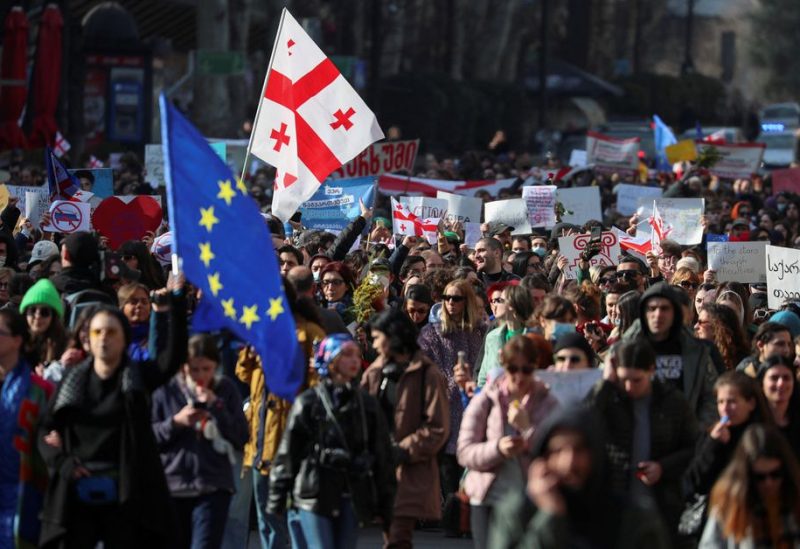
Participants march during a protest against a draft law on "foreign agents", which critics say represents an authoritarian shift and could hurt Georgia's bid to join the European Union, in Tbilisi, Georgia, March 8, 2023 - REUTERS
On Wednesday, thousands of people demonstrated outside parliament in Tbilisi, the capital of Georgia, against a “foreign agents” law that some fear heralds a return to authoritarianism.
After a few dozen individuals broke through a metal barrier that had been set up some distance from the parliament as darkness fell, police used water cannons and stun grenades to push them back.
The measure, which mandates that organizations that get more than 20% of their funding from abroad register as “foreign agents” or face significant fines, was enacted by lawmakers on Tuesday after it passed its first reading.
The ruling Georgian Dream party say it is modelled on U.S. legislation dating from the 1930s. Critics, including President Salome Zourabichvili, say it is reminiscent of a Russian law the Kremlin has used extensively to crack down on dissent and could harm Georgia’s chances of European Union membership.
In violent clashes on Tuesday evening, protesters threw petrol bombs and stones at police, who used tear gas and water cannon to disperse the crowds. The interior ministry said 77 people had been detained.
Protests restarted on Wednesday afternoon with a march down the central Rustaveli Avenue to mark International Women’s Day, which is a public holiday.
“Now is (a) time when we are under direct attack from the government,” said 24-year-old journalist Mikheil Gvadzabia. “It’s very clear that more and more people realise that this is scary and they should fight for their future.”
Thousands gathered in front of parliament as evening set in, carrying Georgian and European Union flags and shouting “No to the Russian law”.
Reuters reporters heard the Georgian, Ukrainian and EU anthems as crowds poured onto the street in front of parliament, blocking traffic.
“We cannot let our country become pro-Russian or a Russian state, or undemocratic. We don’t have any other choice: Georgia is either democratic or there is no Georgia. We will win,” said 33-year-old software engineer Vakhtang Berikashvili.
Footage of smaller protests in the Black Sea resort city of Batumi, Georgia’s second largest, were also shared online.